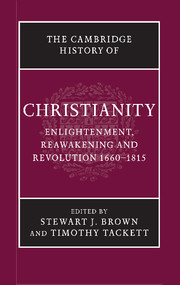Book contents
- Frontmatter
- Introduction
- PART I CHURCH, STATE, AND SOCIETY IN THE EUROPEAN WORLD, 1660–1780
- PART II CHRISTIAN LIFE IN THE EUROPEAN WORLD, 1660–1780
- PART III MOVEMENTS AND CHALLENGES
- 13 Christianity and the rise of science, 1660–1815
- 14 The Enlightenment critique of Christianity
- 15 The Christian Enlightenment
- 16 Jansenism and the international suppression of the Jesuits
- 17 Evangelical awakenings in the North Atlantic world
- 18 Toleration and movements of Christian reunion, 1660–1789
- PART IV CHRISTIAN DEVELOPMENTS IN THE NON-EUROPEAN WORLD
- PART V REVOLUTION AND THE CHRISTIAN WORLD
- Chronology
- Bibliography
- Index
- References
18 - Toleration and movements of Christian reunion, 1660–1789
from PART III - MOVEMENTS AND CHALLENGES
Published online by Cambridge University Press: 28 March 2008
- Frontmatter
- Introduction
- PART I CHURCH, STATE, AND SOCIETY IN THE EUROPEAN WORLD, 1660–1780
- PART II CHRISTIAN LIFE IN THE EUROPEAN WORLD, 1660–1780
- PART III MOVEMENTS AND CHALLENGES
- 13 Christianity and the rise of science, 1660–1815
- 14 The Enlightenment critique of Christianity
- 15 The Christian Enlightenment
- 16 Jansenism and the international suppression of the Jesuits
- 17 Evangelical awakenings in the North Atlantic world
- 18 Toleration and movements of Christian reunion, 1660–1789
- PART IV CHRISTIAN DEVELOPMENTS IN THE NON-EUROPEAN WORLD
- PART V REVOLUTION AND THE CHRISTIAN WORLD
- Chronology
- Bibliography
- Index
- References
Summary
The peoples of early modern Europe assumed the necessity of a single, state-sanctioned church that supported and legitimized civil authority. Political order in both Catholic and Protestant countries was firmly grounded upon religious foundations; lines of political authority devolved from emperor, king, or magistrate and then extended outwards through a Catholic, Lutheran, Reformed, or Anglican church and clergy. The theory called upon to enforce such confessional uniformity was fundamentally the same in all European nations. The Peace of Westphalia (1648) had aimed to reduce confessional conflict between states by recognizing the territorial ministry of religious establishments dating from 1624, but the terms of the settlement proved difficult to apply in practice. While Westphalia granted freedom to adherents of the three recognized confessions to immigrate from a principality unmolested, these liberal terms were sometimes used to get rid of unwanted minorities. Westphalia made no provision for the Jews, and it gave no rights to Protestant sects, whether old (Anabaptist and Socinian) or more recent (Pietist and Moravian). Hence, under the pressure of a resurgent Roman Catholicism on the one hand, and the growing claims of religious minorities on the other, the settlement of Westphalia soon appeared to be unworkable and temporary.
The confessional warfare between Catholic and Protestant states in the seventeenth century gradually gave way to intra-confessional conflict within states during the eighteenth century. The religious fissures that were to have the most influence on toleration were those opened by dissenters within the boundaries of early modern states. In each of the major confessions, whether Catholic, Lutheran, Reformed, or Anglican, it was the new forms of religious dissent – Catholic Jansenism, Lutheran Pietism, Dutch Arminianism, English Puritanism, and broadly, an ‘awakened’ Protestantism – that propelled the arguments and social movements towards more robust expressions of religious liberty.
- Type
- Chapter
- Information
- The Cambridge History of Christianity , pp. 348 - 370Publisher: Cambridge University PressPrint publication year: 2006
References
- 2
- Cited by



